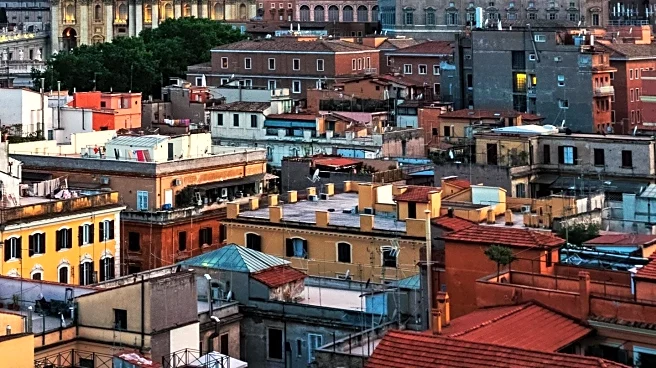What is the story about?
What's Happening?
Over 1,000 LGBTQ+ Catholics and their families participated in a Holy Year pilgrimage to Rome, marking a significant moment of acceptance within the Roman Catholic Church. The pilgrimage included walking through the Holy Door of St. Peter’s Basilica, a rite of passage for Holy Year pilgrims. This event was listed in the Vatican's official calendar, although not as an endorsement, but as a logistical aid. The pilgrimage was organized by Jonathan’s Tent, an Italian LGBTQ+ advocacy group, with participation from other groups like DignityUSA and Outreach from the U.S., and the Brazilian National Network of LGBT+ Catholic Groups. Many participants credited the late Pope Francis for fostering a more inclusive environment within the church, citing his welcoming attitude and actions during his papacy.
Why It's Important?
The pilgrimage represents a shift in the Catholic Church's approach to LGBTQ+ individuals, highlighting a growing acceptance that contrasts with previous eras of exclusion. This change is significant for LGBTQ+ Catholics, especially those from the U.S., where their rights have faced challenges under the Trump administration. The event underscores the impact of Pope Francis's legacy of inclusivity, which has encouraged many LGBTQ+ individuals to reconnect with their faith. The pilgrimage serves as a symbol of hope and progress, offering a sense of belonging and recognition within the church community.
What's Next?
The pilgrimage may inspire further dialogue and actions within the Catholic Church to continue fostering inclusivity for LGBTQ+ individuals. Pope Leo XIV's recent meeting with LGBTQ+ advocate Rev. James Martin suggests a continuation of Pope Francis's policies of acceptance. This could lead to more official recognition and support for LGBTQ+ Catholics, potentially influencing church teachings and practices. The event may also encourage other religious communities to reevaluate their stance on LGBTQ+ inclusion.
Beyond the Headlines
The pilgrimage highlights broader cultural and ethical shifts within religious institutions towards greater acceptance of diverse identities. It reflects ongoing efforts to reconcile faith with modern understandings of sexuality and identity, challenging traditional norms. This development may contribute to long-term changes in how religious communities engage with LGBTQ+ individuals, promoting a more inclusive and compassionate approach.















